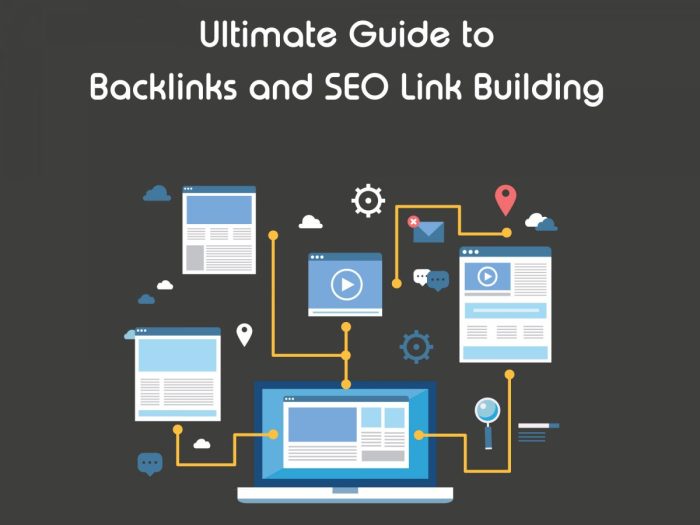Understanding Backlinks dives deep into the world of , uncovering the power of these virtual upvotes that shape website credibility and visibility. Get ready to explore the intricate web of backlinks with an American high school hip vibe that’s as cool as it is informative.
What are Backlinks?
Backlinks are incoming links from one website to another. They play a crucial role in search engine optimization () as they are seen as a vote of confidence for a website’s credibility and authority. When a website has a high number of quality backlinks, it indicates to search engines that the site is trustworthy and valuable to users.
Internal vs. External Backlinks
Internal backlinks are links from one page on a website to another page on the same website. These links help search engines understand the structure and hierarchy of the site’s content. On the other hand, external backlinks are links from other websites pointing to your site. These links are valuable as they show search engines that other sites find your content relevant and worth linking to.
- Example of high-quality backlinks: Backlinks from reputable and authoritative websites in the same industry as yours.
- Example of low-quality backlinks: Backlinks from spammy or irrelevant websites that have no connection to your content.
Types of Backlinks: Understanding Backlinks
Backlinks come in various types, each with its own significance in the realm of . Let’s delve into the different types of backlinks and their roles in boosting website authority and visibility.
Dofollow, Nofollow, and Sponsored Backlinks
- Dofollow Backlinks: These are the standard backlinks that search engines like Google consider when calculating the website’s ranking. They pass on link juice and contribute to improving the site’s authority.
- Nofollow Backlinks: These backlinks contain a rel=”nofollow” tag, signaling to search engines not to pass on any authority to the linked website. While they don’t directly impact , they can still drive traffic and increase visibility.
- Sponsored Backlinks: These are backlinks that are paid for or exchanged for some form of compensation. They should be marked with a rel=”sponsored” tag to comply with search engine guidelines on sponsored content.
Anchor Text Importance in Backlinks
- The anchor text used in a backlink plays a crucial role in indicating the relevance of the linked content to search engines. It should be descriptive and relevant to the linked page to enhance benefits.
- Optimizing anchor text with target s can boost the linked page’s ranking for those specific terms, making it essential to choose anchor text strategically.
Editorial vs. Self-Created Backlinks
- Editorial Backlinks: These backlinks are naturally earned through high-quality content and genuine interest from other websites. They are considered more valuable by search engines due to their organic nature.
- Self-Created Backlinks: These backlinks are intentionally placed by website owners through activities like forum posting, directory submissions, or comment spamming. While they can be useful in moderation, they are not as valuable as editorial backlinks.
Relevance and Authority in Backlinks
- Backlink Relevancy: The relevance of the linking website’s content to the linked page is crucial for . Backlinks from relevant sources have a more significant impact on improving search engine rankings.
- Backlink Authority: The authority of the linking domain also plays a vital role in determining the value of a backlink. Backlinks from high-authority websites are more beneficial in boosting a site’s credibility and visibility.
How to Earn Backlinks

To earn backlinks organically, it is crucial to focus on creating high-quality, shareable content that others will naturally want to link to. This content can be in the form of blog posts, infographics, videos, or any other type of engaging material that provides value to your audience.
Importance of Creating High-Quality Content
Creating high-quality content is essential for attracting backlinks from reputable websites. When your content is valuable, informative, and engaging, other websites are more likely to link back to it as a reference or resource. This not only helps improve your website’s authority and credibility but also drives traffic and boosts your search engine rankings.
Outreach and Relationship Building, Understanding Backlinks
Another effective strategy for earning backlinks is through outreach and relationship building. This involves reaching out to other website owners, bloggers, and influencers in your industry to introduce them to your content and establish mutually beneficial relationships. By building rapport and offering value, you increase the likelihood of receiving backlinks from these sources.
Leveraging Social Media
Social media platforms can also be valuable tools for earning backlinks. By sharing your content on social media channels and engaging with your audience, you can attract attention from other users who may choose to link back to your content on their websites or blogs. Additionally, participating in relevant social media communities and groups can help you connect with potential link partners.
Backlink Analysis

When it comes to analyzing backlinks, tools like Ahrefs and Moz are your best friends. These tools provide valuable insights into a website’s link profile, helping you understand the quality and quantity of backlinks pointing to your site.
Evaluating Backlink Quality
- Relevance: Make sure the backlinks are from websites related to your niche.
- Authority: Check the domain authority of the linking sites to ensure they are trustworthy.
- Anchor Text: Look at the anchor text used in backlinks to see if it is natural and diverse.
- Diversity: A healthy mix of backlinks from different sources is important for a strong link profile.
Metrics for Measuring Impact
- Domain Authority: A metric that predicts how well a website will rank on search engines.
- Page Authority: Similar to domain authority but specific to individual pages.
- Referring Domains: The number of unique websites linking back to your site.
- Linking Root Domains: The number of unique root domains linking to your site.
Conducting a Backlink Audit
- Use tools like Ahrefs or Moz to gather data on your backlink profile.
- Analyze the anchor text, domain authority, and relevance of each backlink.
- Identify and disavow toxic or spammy backlinks that could harm your site’s .
- Monitor your backlink profile regularly to ensure it remains healthy and diverse.
